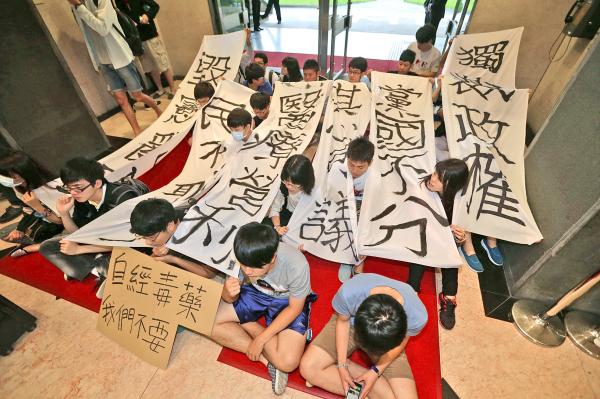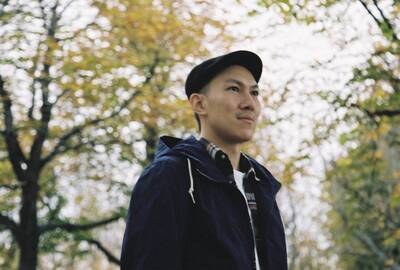《TAIPEI TIMES 焦點》Protesters, activists meet Ma speech

Students demonstrate at China Medical University in Greater Taichung yesterday morning in anticipation of President Ma Ying-jeou’s arrival. Ma later delivered a speech at the university on the sixth anniversary of his inauguration. Photo: CNA
‘HAPPY’ ANNIVERSARY: The president tried to woo the youth in his inauguration anniversary speech, but still called students protesting outside the venue ‘incorrect’
By Alison Hsiao / Staff reporter
Speaking at China Medical University in Greater Taichung on the sixth anniversary of his inauguration yesterday, President Ma Ying-jeou (馬英九) focused on the concerns of the younger generation and took questions from the students there.
However, the president’s presence was not welcomed by all, as he faced protests from both students and labor rights activists.
Addressing the worries of the younger generation about the country’s low salaries, surging housing prices and diminishing opportunities, Ma said that the government would try to bridge the gap between study and work, improve the environment for the young, encourage entrepreneurs, welcome global free trade and engage young people in politics.
The president mentioned various policies to promote internships, help youth unemployment, support new businesses, curb real-estate speculation and provide financial aid to help young people rent or purchase a home.
Ma said salaries have been lagging because “there is little room to generate more benefits within the existing industrial structure, so we need to hitch our wagon to the global trend of regional economic integration.”
He said that “protectionism cannot protect anyone” and only by becoming an indispensable part of the global supply chain can Taiwan secure its economic safety.
“However, Taiwanese society has remained embroiled in the debate about our stance toward [China] during the course of economic liberalization, such as how the student movement reflects some young people’s hesitation toward [warming] cross-strait relations,” he said. “However, we have to understand that China is the world’s second-largest economic entity… What the government has to do is to maximize the opportunity, and at the same time, minimize the risk.”
Turning to the controversial cross-strait service trade agreement, Ma said polls showed that the majority of people believe that the cross-strait agreement oversight bill should be passed as soon as possible, with the service trade pact being reviewed clause-by-clause “at the same time.”
He called the Sunflower movement’s occupation of government buildings “undemocratic, non-peaceful and irrational,” saying that the young generation’s political participation must be “law-abiding” and that a mechanism must be built to “incorporate the young people into the establishment to be seen and heard.”
The president added that he had asked Premier Jiang Yi-huah (江宜樺) to consider setting up a “Youth Consultation Team” at the Executive Yuan to offer advice on public policies.
Despite his promise to listen to young people, Ma’s remarks about having the service pact reviewed in parallel with the passage of the oversight bill went against the student movement’s demands, and he was quick to dismiss the claims of students protesting outside the speech venue as “incorrect.”
One of the issues protesting students brought up was a planned special zone for medical tourism in the free economic pilot zones. They said it would not help the healthcare worker shortage and would widen the gap between the quality of medical service received by the rich and the poor.
The president said that if Taiwan did not establish such a zone, Japan and South Korea’s special medical zones would have the upper hand, and “our physicians would be poached by China” and other countries.
He did not respond to the students’ other criticisms, including the Ma administration’s blurring of the line between party and state, tampering with the Constitution’s guarantees of people’s basic rights, and “destroying Taiwan’s identity and autonomy.”
Dozens of labor rights activists also protested outside the building, including the National Alliance for Workers of Closed Factories and laid-off freeway toll collectors.
They accused the government of siding with corporations, oppressing workers and failing to upgrade industry over the past six years.
新聞來源:TAIPEI TIMES




















